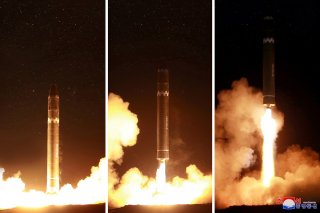Bad News: North Korea Unlikely to Engage Following Biden-Moon Summit
Recent months have seen North Korea repeatedly demonstrate that it believes that time is on its side, and that ongoing U.S. and international efforts to curb its nuclear weapons and ballistic missile programs have failed to do so.
U.S. President Joe Biden is set to host South Korean President Moon Jae-in for a five-day visit this week, during which time the two leaders will discuss a whole host of issues including technological cooperation, ROK-Japan relations, competition with China, and of course North Korea.
Also likely to be high on the list of priorities for discussion during the summit will be the results of the Biden administration’s recently completed North Korea policy review. Specific details about the policy that has emerged from the review remain scarce, but the broad contours of the policy have revealed it to be one which will revolve around a phased approach in pursuit of denuclearization. This approach will rely heavily on diplomacy, but as some have pointed out the details revealed so far about the policy do not indicate a clear idea of how the United States will induce North Korea into beginning diplomatic negotiations. Barring some additional information that emerges from the Biden-Moon summit, it appears that it will be up to North Korea to make the first diplomatic move, something that Secretary of State Antony Blinken has suggested is indeed the current U.S. position.
North Korea at present likely does not have much interest or incentive to make the first move, however. This does not mean that North Korea lacks any interest in diplomatic negotiations, and the country is unlikely to take steps in the near term that would forestall the possibility of diplomatic engagement. But until it is presented with a more tangible offer from the United States, North Korea will continue to avoid the negotiating table. It is more likely that the coming weeks will see repeated instances of the diplomatic posturing and stalemate that has been on display from both the United States and North Korea since the reveal of the Biden administration’s new policy.
North Korea will likely see little value in prematurely coming to the table. When North Korea failed to respond to the Biden administration’s initial back-channel diplomatic overture, it likely did so based on a strategic calculation that playing hard to get would benefit it in the long run; by refusing early talks, North Korea may have been hoping that the Biden administration would place more value on simply getting the DPRK to the table in the future, producing greater inducements and concessions as a means to do so. In addition, North Korea would have been waiting for a clearer understanding of what the Biden administration’s DPRK policy would look like. Things have not changed much since then. That same strategic calculus will likely still factor heavily into North Korea’s decision to enter into diplomatic negotiations, and it will also likely continue to feel out the administration’s new policy before it makes a decision about its next move.
Recent months have seen North Korea repeatedly demonstrate that it believes that time is on its side, and that ongoing U.S. and international efforts to curb its nuclear weapons and ballistic missile programs have failed to do so. In October, North Korea unveiled a host of strategic and conventional weapons systems including its newest intercontinental ballistic missile (ICBM) variant. North Korea subsequently revealed an additional submarine-launched ballistic missile (SLBM) in January, and in March the DPRK tested what appears to have been a new variant of an already very advanced short-range ballistic missile (SRBM). These tests and reveals all indicate continued and persistent progress in a number of important aspects of North Korea’s ballistic missile capabilities, including the development of solid fuel missile engines.
This trend is likely to continue. North Korean leader Kim Jong Un has declared his intention to push on with further development of the country’s strategic weapons capabilities as well as to pursue other significant capabilities, suggesting that North Korea is not clamoring for diplomatic engagement with the United States. Instead, it will continue to diligently make progress on its nuclear weapons and ballistic missile programs while waiting for what it believes to be a sufficient offer from the United States. Absent such an offer, it is unlikely that the coming months will see any DPRK-initiated diplomatic forays.
Eli Fuhrman is a contributing writer for The National Interest.

